#and also seeing better results from the use of those tools
Explore tagged Tumblr posts
Text
To me there's a deeper meaning, though I don't know how to express it, on people using pathologizing language in education i.e. "cognitive atrophy" "brain damage" as an explanation for learning issues.
Which to be fair, the authors of that paper asked specifically not to be used, but the twitter thread linked on that post (which has 38k notes as of this post, jesus christ) did use, extensively. Using language such as "brain damage", "cognitive atrophy" and how could I forget, "soulless".
However, the authors of the paper also didn't have a good methodology, other people have gotten into it better than myself, but the paper does not really point to any cognitive decline, and the methodology used does not offer long-term explanations. But what I do think is that when we're talking about things such as AIs in education, or any other new technology, we should investigate them as tools used in a social context. Why do people use AI as a tool? How do educators and instutions handle this? In which way this tool worsen education or might, god forbid, enhance it? Here the focus, as so much Usamerican education research at least in my experience, is on almost purely numerical and anatomical (EEG? really?) results rather than any pedagogical studies on the tools and their users. (and those results are very poor too)
And once you go down the road of finding pathological answers to educational issues, you will start finding pathological solutions instead of social ones. Why try to confront social or familial issues, when these students obviously have something wrong with their brains? Hell, why even provide them with education, their brains can't even handle it. Eventually you might as well give up and just educate the worthy ones. If you don't believe me, see how education and mental healthcare in the US works.
For someone like me who believes that education is fundamentally a social institution and that every student comes from a social and cultural background that needs to be understood before the process of learning begins, these studies (or rather, unhinged twitter threads) that claim that a complex process like learning can be understood in pathological terms are profoundly hostile to me.
1K notes
·
View notes
Text
Anon's explanation:
I’m curious because I see a lot of people claiming to be anti-AI, and in the same post advocating for the use of Glaze and Artshield, which use DiffusionBee and Stable Diffusion, respectively. Glaze creates a noise filter using DiffusionBee; Artshield runs your image through Stable Diffusion and edits it so that it reads as AI-generated. You don’t have to take my work for it. Search for DiffusionBee and Glaze yourself if you have doubts. I’m also curious about machine translation, since Google Translate is trained on the same kinds of data as ChatGPT (social media, etc) and translation work is also skilled creative labor, but people seem to have no qualms about using it. The same goes for text to speech—a lot of the voices people use for it were trained on professional audiobook narration, and voice acting/narration is also skilled creative labor. Basically, I’m curious because people seem to regard these types of gen AI differently than text gen and image gen. Is it because they don’t know? Is it because they don’t think the work it replaces is creative? Is it because of accessibility? (and, if so, why are other types of gen AI not also regarded as accessibility? And even then, it wouldn’t explain the use of Glaze/Artshield)
Additional comments from anon:
I did some digging by infiltrating (lurking in) pro-AI spaces to see how much damage Glaze and other such programs were doing. Unfortunately, it turns out none of those programs deter people from using the ‘protected’ art. In fact, because of how AI training works, they may actually result in better output? Something about adversarial training. It was super disappointing. Nobody in those spaces considers them even a mild deterrent anywhere I looked. Hopefully people can shed some light on the contradictions for me. Even just knowing how widespread their use is would be informative. (I’m not asking about environmental impact as a factor because I read the study everybody cited, and it wasn’t even anti-AI? It was about figuring out the best time of day to train a model to balance solar power vs water use and consumption. And the way they estimated the impact of AI was super weird? They just went with 2020’s data center growth rate as the ‘normal’ growth rate and then any ‘extra’ growth was considered AI. Maybe that’s why it didn’t pass peer review... But since people are still quoting it, that’s another reason for me to wonder why they would use Glaze and Artshield and everything. That’s why running them locally has such heavy GPU requirements and why it takes so long to process an image if you don’t meet the requirements. It’s the same electricity/water cost as generating any other AI image.)
–
We ask your questions anonymously so you don’t have to! Submissions are open on the 1st and 15th of the month.
#polls#incognito polls#anonymous#tumblr polls#tumblr users#questions#polls about ethics#submitted april 15#polls about the internet#ai#gen ai#generative ai#ai tools#technology
328 notes
·
View notes
Text
when it comes to the umbrella academy, a lot of people seem to think that the first half is great and the second half is terrible. personally, I think only the first *season* is great, or even good. here's why:
the mission statement at the end of season 1 is fixing viktor, but viktor isn't the only broken one, so you can infer that they're all going to have to fix *each other* - as a family, the one thing their abuser never let them be. and the world's burning down around them because of the most dramatic sibling confrontation to ever grace the earth, but they're holding hands and escaping together and surviving the impossible with the intent to move forward, even if that means momentarily moving backwards. it's a masterful allegory for finally growing up, accepting responsibility for your personal trauma and tragedy and how they shaped you, and the moment you take that power back by choosing to heal your inner child, only after being slapped in the face with the fact that if you don't, it *will* destroy everything you've ever built, ever cared about, and ever could.
and then the rest of the show forgets all of it. as it were, it goes in the *exact opposite direction.*
on the surface, the second season isn't *as* bad as the subsequent ones are. but season 3 and 4's faults can be traced back to season 2 by how it pivoted away from the serious subject matter that the story (not the plot - the *story*) was heavily baked in, leaning hard into the goofier elements instead, without ever understanding the contrast that those conflicting elements served to highlight. it made them both more powerful; the jokes were funnier because you were just devastated, and the trauma was more devastating because you were just in tears laughing. the emotional roller coaster is key to understanding these people, and you *have* to take the serious stuff seriously for it to work. at least half of the show doesn't, and as a result, the emotional moments feel hollow.
controversial opinion: as a character, luther is better in season 1 than he is anywhere else. he's more unlikable, but that's because he's implicitly there to show what *not* to do - even if he'd succeeded narratively by locking viktor up and saving the world, he still failed thematically by emulating their father and continuing the cycle of abuse - so luther's a character that's being very effectively used to add to the core theme of the story. he feels like a real, frustrating person, whose brain chemistry got messed up by years of abuse and isolation, all for the crime of thinking his father loved him and wanted the best for him. not like a made up guy on your screen doing silly stuff solely for your entertainment.
season 2 was also the start of the characters getting love interests instead of storylines, which season 1 never would have *dreamed* of; klaus and dave's tragic romance only served to further klaus's character arc, viktor's creepy boyfriend was actually manipulating him the whole time, five's fractured-psyche-mannequin was a narrative tool to let us see into the head of such an emotionally reticent character, and so on. the romance served the character, but fairly quickly into the show's progression, it felt like the character started serving the romance. five was immune to this curse for a long time due to aidan gallagher's age, which is why he's (for the most part) the best, most consistent character across the show, because they had to use their *imagination* for him and actually *write an arc* instead of falling back on tired romance tropes that any selection of characters could slot into to fill the dead space.
after season 1, the umbrella academy is entertaining, but it doesn't have anything to *say.* which is extremely disappointing when the show initially made such a strong case for what it wanted to be.
660 notes
·
View notes
Note
Can we hear your thoughts on Jayce’s and Viktor’s intelligence? I can’t help but feel like Jayce is often…dumbed down. Which feels insulting to the both of them.
Rarrrr.... I should be doing other things... but this is a rage button issue for me... so....
Jayce is just as smart as Viktor.
The reason he doesn't come across as just as smart has multiple elements:
1 ) Arcane S1 in particular does a lot of sleight of hand to set up Jayce as facing down a corruption arc where he's tempted by fame and power. They achieve this in multiple ways. On an emotional level, they often zoom out for his more tender lines and zoom in when he says something dumb or unfortunate.
Intellectually, they tend to show things like his chalkboard after the fact, when he's not at it, but they show things like Viktor actively working in the lab quite a lot. Basically, we see Viktor doing a lot more active science stuff while he's doing it, but with Jayce we tend to see the effects of the science stuff he's already done, like presenting prototypes that are already made, him holding hexgems that are already created, showing equations and notes of his that are already complete instead of showing him making them.
Overall, this creates a visual impression that Jayce is the dumber of the two, because we see him doing less actively, but if you pay attention he's doing at least as much science as Viktor regularly, it's just more off-screen.
2 ) Viktor wouldn't partner with someone who's not as smart as him.
Viktor reroutes his entire life to work with Jayce after reading his notes on Hextech. It's insulting to Viktor's intelligence to think he would "lower himself" to working with Jayce. Jayce is his equal, his partner, they compliment each other and both accomplish things the other couldn't.
For my money, Viktor is the more out-of-the-box thinker, Jayce comes from a family of tool makers and he tends to think in straight lines, most of his innovations are direct results of the spells he saw his Mage do, like weightlessness and transportation, while Viktor tends to come up with things like the Hexclaw and the Hexcore.
But both are also craftsmen and tinkerers, and it was Jayce's idea originally to do magic with technology, Viktor is working with him to innovate on that vision.
3 ) Jayce is a better public speaker and he's physically attractive and muscular, in a way that makes people underestimate his intelligence. It is very common for people who are good at speaking, people who are of above average attractiveness and, god forbid, people who keep an exercise routine to be seen as less smart even though those things have nothing to do with one another. Because Jayce is seen as the "face" of Hextech it's assumed that he's the lesser intellectual partner, when the truth is, it's just a division of labor. Viktor is terrible at public speaking and doesn't like doing it, Jayce is charismatic so he does it.
He's not a gym jock, his muscles come from the forge where he makes absolutely mind-bogglingly advanced items like Caitlyn's sniper rifle and his own hammer, the guy is basically making Hadron Colliders over an anvil. But because people tend to judge based on appearances, people tend to think he's dumb.
4 ) Jayce thinks in straight lines. He's incredibly direct. The reason he agrees to raid the Shimmer Factory with Vi is because he's sick of politics and he's sick of the corruption, and he wants to just deal with a problem directly. That's why he and Vi bring out the worst in each other, because they both think like that, and straight lines aren't always the best way to tackle a difficult problem, but Jayce is a scientist, he's used to seeing a problem and just fucking solving it.
The problem is, that doesn't work for all problems. He's incredibly smart as an engineer, literally Ambessa can't even find a scientist in Piltover as good as him and Viktor, but he's not widely read. He's not a politician or a diplomat or a social scientist. This also lends to the perception that he's dumb but you'll notice, Viktor is never put in a position to make decisions like that, Mel is never put in lab to solve a scientific equation, and in general, most characters aren't put in a position where they have to perform at the top of more than one field in the way Jayce is, so yeah, Jayce ends up looking dumb because he has to handle being the leader of a city when he spent his life working on Hextech and promoting Hextech. Of course he's not going to be perfect.
But that's also another case of sleight of hand, we see Jayce failing at more things because we see him thrown in a position to impact more things. A lot of characters maintain their image of being smarter or more skilled than him because they're not asked to work outside their range of skills nearly so often.
#jayce talis#arcane#arcane meta#i'm tired and rush so might have missed some things but seriously LEAVE HIM ALONE#he's VERY VERY SMART#and ffs stop calling him a himbo he's one of the smartest characters in the show#i freaking hate the himbo allegation for him
377 notes
·
View notes
Text

1 Peter 1:3-9 (NIV). [3] “Praise be to the God and Father of our Lord Jesus Christ! In his great mercy he has given us new birth into a living hope through the resurrection of Jesus Christ from the dead, [4] and into an inheritance that can never perish, spoil or fade. This inheritance is kept in heaven for you, [5] who through faith are shielded by God’s power until the coming of the salvation that is ready to be revealed in the last time. [6] In all this you greatly rejoice, though now for a little while you may have had to suffer grief in all kinds of trials. [7] These have come so that the proven genuineness of your faith—of greater worth than gold, which perishes even though refined by fire—may result in praise, glory and honor when Jesus Christ is revealed. [8] Though you have not seen him, you love him; and even though you do not see him now, you believe in him and are filled with an inexpressible and glorious joy, [9] for you are receiving the end result of your faith, the salvation of your souls.”
“The Source of Hope” by In Touch Ministries:
“Because of Jesus, we have an eternal home in heaven and help for everything we face now.”
Hope can be defined as the expectation and desire for something good. And Jesus is the greatest source of hope—He alone always knows what’s best and has the power to secure its fulfillment.
When life on earth is like a storm-tossed sea, Christ—our anchor—encourages us with the promise of an imperishable inheritance in heaven (1 Pet. 1:3-4). Yet that ultimate security can seem far away when pain is present and there’s no relief in sight. So how do we endure trials here and now? One way is through hope, which anticipates a change of circumstances for the better.
But what about those times when our situation isn’t improving—then what is God doing that’s “better”? Peter tells us He is refining our faith, which will result in praise and glory when Jesus returns (vv. 6-7). This will prove more valuable than gold or even relief from our distress. The difficulties that cause some to lose hope are the very tools God can use to increase His children’s faith in Him.
Christ promises us hope not only for eternity but also for this life. If God does not deliver us from difficulty, we can rest in the knowledge that He is doing a greater work. When we finally reach our eternal home, we’ll see the immeasurable value of the faith He produced in us as we continued to trust in Him.”
[Photo thanks to ImágenesIAcristianas at Pixabay]
#1 peter 1:3-9#jesus is with you#christian life#salvation#hope in god#hope in christ#god loves you#bible verses#bible truths#bible scriptures#bible quotes#bible study#studying the bible#the word of god#christian devotionals#daily devotions#bible#christian blog#god#belief in god#faith in god#jesus#belief in jesus#faith in jesus#christian prayer#christian living#christian faith#christian inspiration#christian encouragement#christian motivation
135 notes
·
View notes
Text
I actually do think that doing magic takes a lot of work and is kinda hard and there aren't very many good shortcuts, and many modern shortcuts actually just amount to leaving out steps, which means you either have to be powerful enough to brute-force it or it fizzles.
Look, I know some people are just much better at magic and witchcraft; anything they do works with little effort, and the lengths some of us have to go to accomplish magic seems bizarre to them. Those people are cool and I wish I was like them but I'm not.
But I also think some of the truth of how to work effective sorcery gets paved over by these "witchcraft has no rules, do anything you want" support posts.
Because A) that is not true, I believe that witchcraft has lots and lots of rules (it's just that nobody else can tell you what they are), and B) I think do anything you want is taken to mean anything you do should work, which is also not true.
I feel like I always see advice given that you don't need to do things (like use physical tools, or cast circles, or whatever). But I never see anyone explaining the techniques and paths of power that are supposed to replace them.
Let's just imagine for a moment that clear quartz really is a universal substitute. Discordians would say that it totally is. So does that mean all you have to do to sub out clear quartz is to just put it on the altar and do the ritual as if it's something else?
Or do you have to do something more?
Do you have to consecrate the stone as being something other than what it is? Do you have to ritually birth it into a new life and baptize it like a baby? Do you have to spend weeks or months honing your technique of focus and beliefs so that you can mentally shift from consensus reality to a personal reality where there is literally no difference between clear quartz and sodalite?
Do you have to raise energies of sodalite and imprint them into the quartz crystal, perhaps working over it for an extended period of time? Do you have to use energy work to tie the clear quartz into Ideal Sodalite so that it becomes like an avatar?
No, you don't have to use physical tools if you don't want to. But that shouldn't be taken to imply that tools are useless or can be replaced in a way that matters by just visualizing that you have them.
A witch spends six months propitiating a tree, ingratiating themselves with the land, offerings and acts of fealty to the tree, a week-long branch harvesting ritual, blood offerings at midnight on a holy day, then another year curing the wood and crafting a wand. Big effort, right?
And you don't need to do that. But if you want that power, what are you going to do instead?
Same with circle-casting. Same with magic on the full moon. No, you don't have to wait until the full moon. You don't have to wait until the moon is in Libra. But there's a really good reason people do those things. So if you want those effects, what actions can replace those effects?
You literally could not do the spell while the full moon is in Libra. That's fine. But then what will bridge the gap? Will you have to raise more energy somewhere else? Include a new aspect? Modify the spell for the moon you can work with?
"You don't have to follow the moon phase for magic" doesn't mean the moon phase is irrelevant and some witches just like to inconvenience themselves for no reason. But it does mean that you can probably adapt your working to overcome the moon being in the inopportune phase.
Every time I talk about how much time, energy, and effort magic can be I feel like someone always replies, "well, it's just not that hard for me! I do what I want with what I have when I need it and it always just works, with very little effort."
Which I think is very great for them, but I also don't think that most people can get results with such low effort.
So anyway my entire point is that I think sometimes the reason people struggle with getting witchcraft to work is because they are operating off of out-of-context soundbites that make it sound like you can just completely cut out some of these foundational concepts of witchcraft.
Maybe you don't have to accomplish those steps in traditional ways. Maybe you don't need all of those steps for every spell you're doing.
But if you've just cut out swaths of steps only because you heard someone say you don't need them (not because of your own experiments working with magic and determining what works best for you), then is there enough left to constitute a functional system of magic?
#don't worry even I am lowkey board of my apparently traditional phase#is this a seasonal thing? am I tedious because it's winter?#I can almost guarantee some time late march I'll be making a post like yeah fuck the moon and circles anything you want is real#beginner witch#witchblr#tbl
324 notes
·
View notes
Text
I love villains, and I especially enjoy Brennan Lee Mulligan’s take on them. His version of Asmodeus in EXU Calamity and Downfall really highlights the reasons why.
A villain is the embodiment of the wrong conclusion. They aren’t always an antagonist; they aren’t necessarily meant to obstruct the protagonist of a story. Hell, they might even be helpful. Villains don’t even have to be evil, per se, they just have to be on the wrong path in the context of the story.
Asmodeus is a brilliant villain and as evil as it gets. He’s the Father of Lies, and he indulges in it deliciously. The lies are always half truths so that the protagonist fills in the blanks with assumptions and gets it wrong. He matches their energy to give them what they want to hear. He plays along with naivety and hope. He doesn’t take anything from people other than lives; they give the rest willingly because they want to believe him. Asmodeus finally reveals his deception when he has someone cornered because he wants them to know they did it to themselves. Asmodeus wants everyone he hurt to come to the realization that “I knew better and let this happen anyway.” He did it to Vespin Chloras, Zerxus Ilerez, and Sarenrae.
From EXU Calamity episode 4, after Zerxus realizes he’s been had:
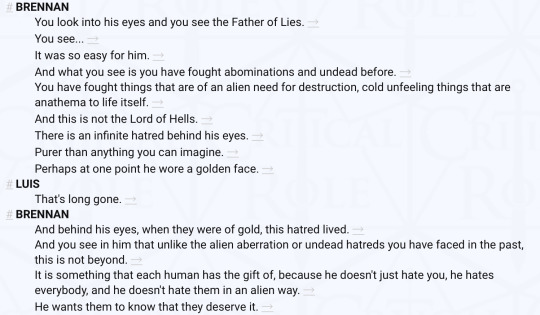
Asmodeus is the embodiment of the desire to punish, and he’s the villain because he’s wrong. That mentality is rooted in hatred. He is convinced that everyone deserves eternal torment, and he wants everyone to agree with that conclusion.
The purpose of Asmodeus is that we shouldn’t inflict punishment based on some idea that the person deserved it. Yes, revenge and victory feel good. Yes, there are often valid reasons to be angry or defensive. Yes, we can come up with a reason to justify punishment. But hurting people because they deserve it is exactly what Asmodeus does. There is always a way to rationalize that someone deserves punishment—so the right answer is that this feeling cannot be a sufficient reason to do harm. That isn’t good enough.
It’s so easy to say “they deserve it” when we know the end result is that Aeor will be destroyed and the surviving legacy is ruins full of monsters. It feels good when we think people deserve to suffer and then we get to see it happen. It feels righteous.
Vespin Chloras deserved to be remembered as a traitor because he was arrogant enough to think he could replace Asmodeus—in an age where another mage already replaced the god of death and yet another mage created a machine that killed two primordials. Zerxus Ilerez deserved to be a thrall of Asmodeus because he chose to take up the mace and contributed to the problems that got him in that dilemma—because he so fervently believed that under all that hatred was a person who needed a chance to change his mind. Sarenrae deserved to lose her followers because she decided to trust the Father of Lies—because she loved her brother and offered him mercy.
It’s so easy to conclude that someone deserves pain. Asmodeus is here to remind us specifically that it’s not the right way to handle anything.
Asmodeus is also a rather effective villain because he is supposed to be irredeemable. Archetypal villains are wonderful tools for setting audience expectations. Whether Brennan plays that straight or decides to subvert it, there isn’t as much work needed to persuade us that Asmodeus is that evil or cruel. We already believe that he’s capable of doing the worst things imaginable. Toying with those expectations is a great storytelling exercise.
Asmodeus didn’t shock us in EXU Calamity because we didn’t expect him to be evil. He was shocking because he is such a skillful liar that we wanted to believe him. It would be such a satisfying story that a well-meaning paladin was the first person to show kindness to the Father of Lies and managed to atone him. Brennan’s portrayal made us want that subversion so badly even though we knew better. Asmodeus lured us into the same trap as the characters, and then we saw the outcome: punishment—because Asmodeus will use any reason to justify it and every opportunity to inflict it.
In Downfall, Brennan could have easily rationalized that the protagonists wouldn’t agree to the truce if Asmodeus was on the infiltration team. The audience would have absolutely found that plausible. He didn’t have to be here. The decision to include Asmodeus on the side of the protagonists gives us a heads up that the story will grapple with questions about punishment.
What do I need to see before I am justified in destroying a city with no survivors? Do I have to concern myself with bystanders? Do the fearful deserve to die for choosing to oppose me? Don’t they deserve it for creating such objectionable technology and magic? Don’t I deserve the chance to live without fear of those lesser than myself? Don’t they deserve to die for corrupting those I loved? Don’t they deserve it for being loved more than me?
Why isn’t hatred a good enough reason to hurt someone?
Again, villains are tools to highlight the wrong conclusions. Asmodeus is involved to highlight that the desire for punishment isn’t a sufficient reason to destroy Aeor. The other characters, villains or not, are here to show us what other justifications there might be. Their interactions are going to brush across these themes over and over again.
I fucking love villains, and no one plays a villain quite like Brennan does.
#critical role#brennan lee mulligan#downfall#exu calamity#asmodeus lord of the nine hells#post script: also he’s just fun#just an unreprenant asshole on every level#love it
263 notes
·
View notes
Text
Honestly, overall, I think most of the criticism towards Marinette for her lies and secrets surrounding Gabriel's identity and Sentidrien have at least been relatively on-target. I think some of them have been overly pessimistic towards her, but it hasn't been insane, and it's at least been about things she actually did.
Like, try comparing it to the reaction with Chameleon salt, especially towards Alya. (Yes I'm still bitter about that. I might have stopped being bitter IF IT WASN'T STILL A SUPER POPULAR FREAKING GENRE UNTO ITSELF).
Most of the saltfic scenarios and criticism towards Alya for her actions in Chameleon have been based on "what-ifs" such as "what if she fell for Lila's lies so thoroughly that she believed any nasty thing Lila claimed about Marinette, and then responded by being verbally abusive towards Marinette and even outright violent towards her, outright bullying her even." Making this gigantic leap from "She can't clock Lila's lies" to "she will be more horrible towards Marinette as a consequence of those nasty things she says than we've seen her be towards her worst enemies." And then also writing or fantasizing about her being punished by like, losing her ability to get a job in the future, being disowned by all her friends, having grown celebrities say nasty things about her, etc.
Most of the Marinette salt I've seen has been more limited in scope, with most of it being about actual things she did in the show, though sometimes ascribing nastier, more malicious intentions than the narrative does, like having her treat Chat Noir like a tool or being interested in her own comfort at other's expense. But it's still using actual examples of things that happened in the show for it.
Like... the closest equivalent of the Alya bashing fic tsunami that resulted from Chameleon would be, when applied to the stuff Marinette's being salted for currently (well, some of it. The Alya bashing fic stuff is SO out of proportion I don't know that it's possible to do this in a totally proportional way) would be for Marinette to take the fact that she was given Adrien's Amoks and that he doesn't know about them, for her to mind-control him into being her boyfriend, using them to force him to have sex with her and drain all of his bank accounts for her, and then having his friends realizing what she's doing to him, beat her up, ruin her for life, and for Adrien to leave and find a better girlfriend.
Like with Alya bashing fics, it's following off of a "what if?", in this case, "what if Marinette kept the rings and was a way more awful person than she's ever been shown to be in the show." Similarly, Alya bashing fics tend to use the "what if" of "what if Lila told far worse lies about Marinette than we've seen, and Alya was a way worse person than she's ever demonstrated to be?" And yeah, in the Marinette scenario here, we actually see her giving Adrien back his Amoks. But given that he doesn't know what they are, she could feasibly ask for them back without him knowing how important it is that he keeps them. Also Alya has demonstrated that she won't believe particularly nasty lies that Lila tells about Marinette, even with evidence (we see that in Ladybug), but that hasn't stopped the saltfic industry from flourishing in the half a DECADE since that episode aired.
The fact that I'm not continuously seeing 15% or so of Miraculous fics making Marinette out to be mind-controlling abusive rapist in order to have Adrien and his friends take revenge on her shows how much more sane and reasonable the current wave of Marinette salt is from the STILL ONGOING Chameleon saltdom tsunami.
...I'm still just very bitter about this. I still see people asking for these kinds of fics like they're just normal things, and even with filtering them out and muting people, I still run into fics regularly that do this sort of crap to Alya (and a lot of the other ML characters to be fair, but Alya gets it the worst.) And it just makes me laugh whenever I see people complaining about how unfairly hostile the ML fandom is being towards Marinette because it's STILL, even now, six years after Chameleon aired, less than the shit towards Alya, and I feel like I'm yelling into the void to an extent here because it's been normalized to the extent that it's just priced into the Miraculous fandom it sometimes feels like. When it's so far outside the bound of any realm of normality or sanity relative to the shit thrown at most of the other characters, that it becomes comical when you actually try to put them into proportion with each other.
I still just can't stop feeling this festering bitterness about the unfairness of it all.
78 notes
·
View notes
Text
No Accounting for Taste
For the @steddie-spooktober day 11 prompt: "That is the dumbest looking jack-o-lantern I've ever seen." Rated: T | Words: 1114 | CW: None | Tags: established relationship, bickering, fluff, annoying older brother behavior Divider credit: @steddiecameraroll-graphics
Follows day 3: Tastes Better on You

“Wait, no, not like that.”
“Do you want to do this?”
“No, I just – like, you should make it a little pointier there and–”
“I will give you the knife, just–”
“Steve, if you’re going to stab Eddie, can I have his share of the pumpkin seeds?”
Steve and Eddie both look up from the pumpkin they’ve been arguing over to where Max has spoken from across the kitchen.
“Also, I’ll need a new ride home, if you do,” she adds, her own focus still on carving out the mouth of the pumpkin she and El are collaborating on.
“I’m not going to stab Eddie.” Steve rolls his eyes. “At least, not if he makes up his mind.”
“I have made up my mind!” Eddie insists. “It’s very made up! I’m trying to impart my vision of a perfect jack-o-lantern to you, and things are getting lost in translation.”
“Uh huh.” Steve turns an unimpressed look back on the pumpkin. “You want the eyes pointier?”
“Yeah. Really make those corners sharp,” Eddie says, dragging his finger around the edges of the eyes Steve has already carved in.
“Well, I’m wielding a steak knife, but I’ll see what I can do,” Steve drawls.
“I’m using a steak knife and I’m not having problems,” Dustin pipes up from behind his pumpkin.
“Having problems keeping quiet is what you’re having,” Steve mutters, already applying himself to carving out the corners of the eyes, and Eddie snorts out a laugh.
Sharing a pumpkin had seemed like such a good idea at first. Max had offered to share with El, since El had never carved a pumpkin before, and they aren’t having issues. And at first, neither had Eddie and Steve; Eddie had dealt with the “slimy shit” and gutted the pumpkin, as promised, and then he’d pressed the handle of the knife into Steve’s hand.
“I killed it, now you’re going to carve it,” he’d insisted.
(This had been as much to include Steve as it had been to keep him from snapping at anyone who came too close to getting pumpkin innards on the kitchen floor.)
“Are you sure?” Steve had asked. “I haven’t carved a pumpkin in a long time. I don’t even know what to put on there.”
“Of course I’m sure.” Eddie had pecked a kiss to Steve’s cheek. “You carve, I’ll direct. I have a vision.”
It turns out, however, that getting Steve to see his vision has been rather difficult. It has so far involved a lot of charades, references to movies Steve hasn’t seen, and one instance of attempting to use Mike as a prop (this had been short-lived and not particularly helpful). The results are… mixed.
Steve is certainly getting the eyes to a finer point, though Eddie will admit there are limitations in using a steak knife as a carving tool (he would, however, love to see Mrs. Harrington’s face if she were to learn that her nice cutlery had been used on pumpkins by a feral pack of teenage misfits). The nose needs some fine-tuning, and the mouth is… well, Steve had done his best. That one’s kind of on Eddie; he’d told Steve to make the teeth “needlelike,” and a few had come out so thin that they’d snapped right off.
But the remaining ones do look like needles!
“Okay, so, for the ears–” Eddie starts, only to be cut off when Steve’s head snaps up from his work.
“Just how complicated is this thing supposed to be?” he demands.
“We’re almost done, I swear.” Eddie tosses his hands up in surrender.
Eyeing him with suspicion, Steve is likely just about to tell Eddie how far he trusts that assurance when Mike stumbles right into their staring match.
“Hey, do you guys have the– holy shit.” He pauses, whatever it is he’d been about to ask for forgotten as he takes in an eyeful of their pumpkin. “That is the dumbest looking jack-o-lantern I’ve ever seen.”
“Okay, y’know what, Wheeler?” Steve gestures at Mike, apparently forgetting (probably?) that he’s holding a knife as he does so.
“Actually, Michael,” Eddie jumps in, subtly pushing Steve’s hand down in the process, “our jack-o-lantern is genius.”
Mike shoots him an impressively bitchy look of disbelief, so Eddie goes on.
“See, the rest of you can have your pretty, symmetrical pumpkins, carved up all nice and neat, but do you know what that’s going to attract?” Eddie looks around at the assembled teenagers without waiting for an answer. “Vandals! Nothing is more tempting on Halloween night than the prospect of smashing a perfectly carved jack-o-lantern.”
“And you know this, how?” Lucas snarks.
Eddie ignores him. “Meanwhile, mine and Steve’s masterpiece will be practically invisible. It’ll escape the night unscathed and live to see the dawn of November!”
“Because it looks like someone already kicked it in,” Mike deadpans.
“It’s called camouflage, Wheeler,” Eddie shoots back.
“D’you think Mike’s will be the first to go?” Steve leans in, stage whispering to Eddie.
“It’s a pretty tempting target,” Eddie agrees in an undertone that isn’t at all quiet. “But then, Henderson’s is pretty big…”
“Hey!” Dustin squawks, popping up from behind the pumpkin that had nearly taken both him and Steve to get from the van to the kitchen.
This is the beginning of squabble over whose pumpkin is nicest and thus most likely to be vandalized, and whether or not this is a compliment, which Eddie observes with glee.
“Steve!” El calls over the ruckus. “I am finished with the seeds.”
While Steve can’t stand the feeling of pumpkin guts on his skin, El had deiced the sensation was a delight, and so had been tasked with separating the seeds from the pulp for roasting. She’d taken to the task with single-minded zeal, only emerging to offer the occasional opinion as Max carved their pumpkin.
“That’s my cue.” Steve hands the knife to Eddie and presses a kiss to the corner of his mouth. “I’ll let you take care of the ears.”
Eddie watches as Steve crosses through the chaos of the kitchen, dodging waving hands and piles of pumpkin chunks to reach El on the other side.
“Wow,” Steve says, eyeing the large bowl she’s nearly filled, “that is a shit-ton of seeds.”
“A shit-ton,” El agrees solemnly.
“Yep, Hopper’s going to appreciate me teaching you that one.” Steve claps his hands together. “C’mon, let’s get those rinsed, and then we’ll season them.”
Turning back to the mess that is their shared jack-o-lantern, surrounded by the din of arguing teenagers, Eddie can’t help but grin. There’s really no saving the thing, but he thinks he loves it anyway.
#steddie#eddie munson#steve harrington#the party#stranger things#steddie-spooktober#eddie & the party#steve & the party#solar wrote#eddiesteve
172 notes
·
View notes
Note
Hello, I have a question I'd like to ask: do you know how I can write a truly terrifying villain who's a manipulative abuser masquerading as a charitable sweetheart? (this ask might get dark)
My story's protagonist, Karina, is trapped in an unhealthy relationship with her older sister, Mina (otherwise known by her stage name Aphrodite) who treats her like a tool and constantly uses various cruel methods (emotional manipulation, lies, verbal and physical abuse, memory-altering, victim-blaming, using innocent lives as leverage, etc.) to ensure that she never leaves her despite Karina desperately trying to.
Mina puts on a mask of being a gentle beauty but is, in truth, a cruel and heartless person who is desperate to not be a "#2". She is fiercely jealous and resentful of anyone who (she believes) has a better life than her, especially women. Many know her to be the humble founder of a charity association but, unbeknownst to the public, she also owns a "nightclub" where corrupt(ed) individuals are allowed to indulge in their twisted desires and torture anyone —including her sister— in various horrific ways.
Hi, thanks for asking! To craft a manipulative villain like this, who manipulate others to the point of warping reality itself, you need to build layers upon layers of deception. What makes Mina, your antagonist, so terrifying isn’t just what she does but how inescapable she is, how deeply she's embedded herself into Karina’s mind, and how the world adores her to the point of even her victims themselves having moments of doubt. Here are some tips!
Writing a Secretly Manipulative Villain
1. The most terrifying monsters are the ones who look like heroes.
A great manipulative villain isn’t just someone who tricks the world—they trick the reader, too. Someone like Mina must be so convincing and sincere that even when we’re inside Karina’s head, there’s a moment of doubt. You seem to have developed her well in this aspect, giving her a carefully constructed mask to hide her hunger for power and insidious grip on those around her.
Charm as a weapon: She should be effortlessly likable in public: warm tone, soft gestures, all types of charming. She should never act overtly villainous where anyone can see; rather, her manipulation should be delicate, precise, invisible to the untrained eye.
Philanthropy as a shield: The fact that she runs a charity makes her untouchable. If anyone accuses her, the world comes to her defense. After all, how could a woman so devoted to helping others possibly be a monster?
The gentle knife: When she does hurt Karina, it’s never an outright, obvious explosion (or if it is, it’s followed by masterful damage control). Someone like this would make Karina think it’s her own fault, sugar-coating insults, and delivering any punishment is delivered with a disappointed sigh that says I just want to help you or it's for your own good.
Also, emphasise the whiplash of her cruelty and kindness: one moment, she’s the doting older sister, telling Karina how much she loves her and how everything she does is for her own good, then the next, she’s turning cold, reminding her exactly what happens when she steps out of line. Abusers like her make their victims doubt themselves—Karina might keep telling herself, "maybe Mina isn't that bad" even when the truth is staring her in the face.
Prompt: "I try so hard to love you, but you make it so difficult. Do you even understand how much I do for you? How much I protect you from? No, I don’t think you do. You’re too selfish to see it."
2. Gaslighting
Rewriting the past: She reframes every act of cruelty as one of love, or as a result of Karina's own behaviour: if she hit her, it was because she was being difficult; if she was hurt at the nightclub, she should be grateful that Mina saved her from worse; and if she ever tried to escape, she’s reminded of all the times Mina “took her back” out of kindness.
Controlling the narrative: If Karina ever does try to confide in someone, Mina already has a pre-built counter-story ("Oh, Karina has always had such an active imagination. I try my best, but sometimes she gets these ideas in her head...").
Using love as a weapon: Mina makes Karina believe that she owes her everything, and that without her she would be nothing, telling her that the world outside is cruel and unforgiving and she’s safer right where she is.
An example of a character like this can be seen in The Housemaid by Freida McFadden (⚠️spoiler⚠️), in which one of the characters, Nina, has a manipulative husband who seems perfect until he punishes her for a minor inconvenience through torture, then twists it to make her believe it never happened and the near-tragedy that occurred afterwards was her own fault. She believes this and thinks she's crazy until the torture happens again, at which point it's too late for her to escape due to what he has on her. Gaslighting is one of the strongest weapons of someone like this.
3. The nightclub
A carefully curated circle: Mina shouldn't let just anyone into the club—rather, the people who frequent it are ones she’s selected, and considering she wants to keep up her front, they would likely be people with power and sins of their own who owe her something. They protect her because she protects them.
Using Karina as a puppet: Instead of just making Karina be a victim, she could force her to participate as well. It could start small with things like greeting guests or playing hostess, then escalate to using her to lure people in, making her watch, and overall making her complicit. Someone this sadistic might not settle for Karina’s own suffering, wanting to torture her further by seeing other people experiencing it and break her into something unrecognisable.
Prompt: Mina drapes an arm around Karina’s shoulder, guiding her through the lavish, dimly lit club. Her lips brush against Karina’s ear. “Smile. You don’t want to make our guests uncomfortable, do you?”
4. A villain who will never let go
The most horrifying aspect of Mina might be just the fact that she will never stop coming after Karina even if she does manage to escape.
The fear of leaving: Karina knows that even if she escapes, Mina will find her and plague her with not only threats or further torture, but apologies and public spectacles that will make others believe that Karina is just a troubled girl running from the only person who ever cared about her.
Escalating control: The moment Mina senses she’s losing Karina, she might escalate: at first, through guilt-tripping, then cutting her off from resources, friends, or potential allies, and violence, overall destroy Karina’s life so thoroughly that there will be nothing left to run to.
Public persona: Outwardly, make her seem too perfect; people love her. She's the kind of person others defend rabidly. Everyone being so convinced of her goodness makes Karina feels utterly trapped—because even if she does break free, who will believe her?
Hope this helped!
Previous | Next
#ask#writeblr#writing#writing tips#writing advice#writing help#writing resources#creative writing#writing villains#deception-united
107 notes
·
View notes
Text
The tyre whisperer

George Russell x fem!OC (Grace)
Summary: Grace is about to release a project with new tyre development for Mercedes and she needs a help from George and the team. (a "little" plot twist at the end)
Warnings: none, a few curse words
Word count: 1.7k
A/N: Silly little blurb from my archive with my OC Grace. Some things may not correspond to reality, but we like to live in fantasy and adjust the rules to our liking a little, so don't try to lecture me about racing or other things that goes around with it, I needed to change some things for the plot. Also prepare for the repetition of a word "tyres". But whatever, I wrote this for me, so I'm sharing it with you as it is. Enjoy it. :)
Any feedback is welcomed. :)
---
“It’s always all about money. You have no idea what ridiculous amounts are flowing through there.” Grace was talking to someone over the telephone with an annoyed voice. She worked as a purchasing manager for technical services for Mercedes. It was very rare for her to appear at the race let alone in the garage. But it was necessary from time to time, because she needed to see how the tyres were working along with other tools the team was using. Her attention was on the special and secret project to get the new brand of tyres on track, they guaranteed better quality and performance, maybe less pit stops. Working hard on launching this project to the ongoing season, she argued a lot with Toto, who wasn’t fond of testing the unknown brand on race. But engineers around driver George Russell were more than willing. They talked Toto into that, and that was it.
Being in Belgium wasn’t that bad apart from her being at Brackley all the time. She walked to the garage to meet with the team and get through the process of preparing all the things that were needed.
“Nice to see you here, Grace.” Toto smiled as he greeted her.
Grace gave him a smile, her eyes reflecting a little surprised expression at his warm greeting. “Long time no see, Toto. How's things going?”
“Mostly good, we tried some test tyres on Friday’s practice and it was good, George said it was completely different from what we used to this day. We have the fresh new two sets prepared for today. Marcus is expecting two pit stops for George.” They spoke as they were walking towards the stack in the garage. Grace hummed in response, looking over the packing of the tyres, checking if it has the all right labels.
“You know, I’d like to make it one pit stop, maybe none actually.” She tried to tease the waters with a smile.
“You’re crazy, I must say. That’s not gonna happen.” Toto snorted, shaking his head in disbelief at her idea.
“I think you’re underestimating George and his skill of being on one set of tyres for more than half of the race.” She chuckled pinpointing the race in Monaco.
“Someone is talking about me?” Suddenly George appeared behind them. Truth about Grace and George was that they weren’t really good at communicating with each other as Grace always seemed to despise the stuff about racing and she wasn’t really into the rich people around her. But she always acted with a respect for George in her kind of way.
“Hey, George. We’re just talking about your tyre skills.” Grace smiled, greeting George, who chuckled at her remark.
“Today is not the day for crazy things, isn’t that right Toto?” he smirked mischievously.
Toto frowned, looking between them both, gritting through his teeth. “Don’t you dare.”
Grace then talked with George about his experience and opinions on a new brand.
“I must say that you did a great job, getting this innovation here. Toto was furious anytime you talked to him.” George chuckled, zipping his race suit and fixing his hair for a helmet.
“The old man needs to know what is good for his team. But it was a very hard period of time for me, to actually be heard. And your team proved the best effort to get better. And I wish today we will see the best results. Drive like you always do, but try to get the most of those tyres. You know, strategies can change during a race.” She winked at him as she walked away nodding at Marcus, his race engineer, who smirked a little. George understood that this was some secret communication behind Toto’s back. And he knew that he’ll be furious. But also, George was glad that his team trusted him that much in this case and who was he to not deliver the best.
The race was good, George got to the first position after a few laps and he managed to hold it. Weather was sunny, no rain. Grace had her head set on as she watched him moving through the track on the displays in front of her. She was looking at the performance sheets when she heard Marcus instructing George to get to the box. That was the first. She really hoped that they could make it to the end of the race with that, but she tried not to push it too much.
Last ten laps till the end of the race, Toto questioned Marcus on why he wasn't navigating George to box. He then asked George through the radio if he’s in for it.
“Absolutely not. These tyres are good. I’m good.”
That answer made Toto mad, blood boiling even, but he only sighed with ‘okay’.
Grace felt excited rush flowing through her veins, her plan was going good and she’s gonna get the results she needed.
George finished the race in first place, leaving everybody speechless. Chaos in the garage and screams of the team echoed everywhere.
She looked at Toto who had his usual sceptical look but he managed to laugh when he hugged her and others too.
“I told you.” She said excitedly.
“We’re gonna talk about that little stunt later.” He laughed.
After some celebrations, podium and interviews, there was a time for team debrief about the race.
Toto thanked everyone as usual, talking about the performance of the cars. Then he went to the topic about tyres.
Grace looked over at George and they exchanged smirks.
“I must admit that our performance was very impressive with this new type of tyres. Getting only one pit stop through the entyre race is a good result but I don’t know if that’s gonna happen again. I’m not sure if that's a sustainable situation.” Toto was talking seriously. Lewis, who was slightly annoyed by the whole thing, because they didn’t choose him for testing, smirked deviously at Grace.
“I think we got the best results today, the ones that I wanted to see, maybe even better. I’m not the one to talk into your strategies about race, but-“ she tried to argue but Toto interrupted her.
“But you did. That’s another thing I wanted to say. If we’re gonna decide to have a two pit stop race, it’s gonna be like that. I could have penalised all three of you.”
“That wouldn’t be wise.” She tried to argue.
“Grace, honestly-“
“I can cut the sponsorship for tyres immediately if you continue to talk like that.”
She said that with confidence, crossing her arms, looking at Toto. Everybody in the room was speechless. Nobody ever tried to oppose Toto.
“So. Fine. I’m not gonna talk to the strategist anymore or get drivers on my side. I want the best for the team, for the best performance. And we all did a great job today, especially George, who proved that those tyres are more than capable to handle the track and ride. I saw enough to release the project and let you get the tyres from the new brand. I declare this testing as an accomplishment.” Grace scanned the room, making eye contact with everybody around.
George sat there, impressed to his bones about her. She was a beast, getting to the point every time she got to speak. She wasn’t the one to give up.
Toto sighed, massaging his temple. “Okay. Those new tyres are more than great, we can have them but no more crazy attempts to try to get the most of it. I don’t want any unwanted attention on us. Especially not from FIA. Grace, please make sure that this supplier won’t be involved with RedBull. This is only ours.”
“Actually I’m in the process of making it our Mercedes only brand.. RedBull can’t get those tyres even if they decide to stand on their heads.” Grace smirked, satisfied.
“But how could you have known that today will be successful?” Toto was confused.
“Actually…” George cleared his throat and Marcus with Bono scratched their necks in nervousness.
“We were testing on the summer break in Sakhir.” Mick said out of nowhere.
“You did what?” Toto blurted out, his face pale from shock.
Grace tried to act nonchalant. “Today was just a test on the track, just a formality. Do you really think I’d be risking the race for the test of an important thing like this?”
Toto looked like he saw a ghost. He felt a million feelings at the same time from frustration to relief.
“You- You were at Sakhir without my consent? You, George, Bono, Marcus and even Mick? Really?” Toto said breathlessly.
They all nodded without a word.
“You’re lucky this thing is working and nobody spotted you. Hell, you’re fucking lucky. That’s unbelievable that the press didn’t get to that.”
Lewis had enough as he stormed out of the meeting room. Bono went after him, he was his race engineer for so long and it felt like betrayal for Lewis.
After that Toto ended the debrief and everybody went after their own business.
Grace was standing at the parking lot, leaning against her car like she was waiting for someone.
“You don’t know how to start your car or…?” Voice beside her sounded amused as she turned her head to its direction. Her smile went wide, taking a few steps closer towards the figure.
“I’ve got us nearly into trouble. But he handled it well, didn’t he?”
“I guess so. He’d need some time to process it.”
“Instagram says that you’re the tyre whisperer.”
“Oh, is that so? I wouldn’t be without you, love.”
Grace sneaked her hands around George’s waist, lifting her gaze up with a chuckle.
“How long do you think that we’re gonna keep this under the cover?”
“Are you seriously asking me this here, where all eyes can see?”
“I guess I am.”
“I want the whole world to know that my heart is with you, Grace.”
“So, be it.”
With those words she leaned closer to him and claimed his soft lips in a deep loving kiss. Oh how she missed that.
“ARE YOU FUCKING KIDDING ME?!” Toto was standing at the entrance of the paddock which was near the parking lot, looking directly at them. His face was red from shock with his eyebrow quirked.
“Guess we’re in trouble now for real.” George laughed softly.
---
Tags: @chilling-seavey
#george russell#george russell x reader#f1#f1 fanfic#f1 fic#f1 imagine#f1 x reader#fiction#f1 x you#formula 1#george russell x oc#george russell x you#george russell oneshot#george russell fanfic#george russel imagine#george russel x reader#george russell imagine#gr63 x you#gr63 x reader#gr63 fic#gr63#gr63 x oc#my fic#writing#formula one#f1 one shot#x oc#original character
63 notes
·
View notes
Note
My boyfriend traveled to Europe for a work trip. What's the protocol for when he gets back to make sure he didn't pick up COVID? I just assume the CDC website these days says not to worry about it and viruses are made of sunshine and rainbows.
The CDC's recommendations are made of worse than sunshine and rainbows: they're made of okaying a CEO to refuse his workers sick leave for covid in 2021. That shit they say about "not having a fever" is literally based in an old wive's tale about illness in general, as they science says nearly 60% of all covid spread comes from asymptomatic or presympomatic people. Tbh, the HHS, CDC, and NIH didn't need to have RFK and Battacharya put in charge to destroy them, they've been doing it to themselves for years by bowing to corporate desires instead of standing behind evidence-based airborne mitigations to protect the public health... but that's a different rant.
1. He needs to be wearing a quality mask the whole plane trip. The newest LP.1 strain is on the rise in Europe and is more transmissible. (This is one of those things that would have been good to plan for a month ago so you could get sip valves and the like for hydration)
2. Mask mask mask when he gets back. I assume you don't have a molecular home test. Rapid tests are incredibly fallible until people become more symptomatic, so taking a negative RAT as a sign of safety is potentially a route to exposure. Metrix sells a molecular home test with much better results that looks for *any* covid, not just high viral load. Order one now (they also make combo covid/flu tests, but IDK if they've hit the consumer market yet).
3. If you can, cordon off an area to be his quarantine for at least a few days. (Tips on how to do that) If you're using RATs, aim for two a day about 12 hours apart for the first 3-5 days. If you're seeing nothing, and assuming he's been in Europe for a while, you may consider relaxing your home quarantine, especially if you have air filtration and good ventilation in place.
4. If he does test positive, both you and he should continue to mask often, but his masking is most important. Source control is key in preventing spread of covid. Have him open the windows he can and assure there's a negative pressure out so his aresols don't creep into the home (guides in the isolation protocols linked above). Make sure he has his creature comforts (game system, books, movies, etc.) and plenty of tasty snacks and nutritious food. You can use video conferencing tools to have time together, talk during meals, etc. A lot of what you do if and when he gets sick is up to the limitations of your home (idk what size, style, or environmental factors are coming into play: it's easier to quarantine in a 2 story mcmansion than a 2 room apartment.) But he can come out once he's passed a series of rapid tests (3-5 is the rule of thumb to assure no false negatives, which are common) or a home molecular test.
#mask up#public health#wear a mask#wear a respirator#still coviding#pandemic#covid#covid 19#coronavirus#sars cov 2
80 notes
·
View notes
Note
How good would a whip be as a weapon? I'm not interested in it being a lethal weapon but more of it being a weapon that can defend someone long enough to get away or at least disarm or disable someone. I don't see a lot of people or character or referrals on how to use it and that's probably because it's not good enough?
Not great. The whip, like the goad and cattle-prod, aren't really designed for use as weapons. They're designed to control animals. (...and, yes, that does sometimes include humans, but again, in a non-combat, control role.) Part of the problem with the whip is, it's not much use against someone wearing armor. Or, even, heavy clothing.
Now, whips do have a legitimate military history as discipline tools, but that's very different from trying to take them onto the battlefield.
The reason reason you'll still see characters using whips, when you've probably never even heard of a goad, is because the whip is visually dynamic. It looks cool. You don't see Indiana Jones using a whip because it's the best choice of weapon, you see him using one because it stands out, and as a result, it has become iconic. It's delivering a specific vibe.
At the same time, the goad is just a pointy stick.
Whip disarms are a neat trick. And, very doable in a controlled environment. However, successfully disarming someone who's actively trying to kill you is going to be a bit more challenging, and also raises the question, “If you're putting this much effort and attention into taking away someone's weapon, shouldn't you be spending that effort and attention taking their life instead?”
This is probably little thought experiment about combat disarms. There's no point in disarming a corpse. So, why not just skip the middle step and go straight to the corpse-making? A question that Indiana Jones famously answered when, instead of dueling a sword master, simply pulled out his .455 Smith & Wesson and dropped the guy. (The real reason was that Harrison Ford was ill from food poisoning, and in no condition to shoot a prolonged fight sequence. So instead we accidentally got a character defining moment of pragmatism.)
To be clear, if it seems that I'm a bit negative on the subject, I do think the whip is a neat weapon. It's visually dynamic. It's loaded with symbolism. I think it's fantastic in a fictional context. It's just not practical.
There are fantastical versions of the whip that are better options. William Gibson's use of monowire comes to mind as an immediate example. Where the whip itself is created from a monomolecular carbon fiber, and can, as a result, cut through basically anything it strikes. Similarly, I still have serious reservations about the Lightwhip from Star Wars' old Expanded Universe, but it would carve through anything pretty effectively (including the wielder.)
Even in those cases, the whip is a weapon you choose for the aesthetic, more than the practicality.
-Starke
This blog is supported through Patreon. Patrons get access to new posts three days early, and direct access to us through Discord. If you’re already a Patron, thank you. If you’d like to support us, please consider becoming a Patron.
361 notes
·
View notes
Text
"ELVIS FASHION: FROM VEGAS TO WASHINGTON"
ELVIS PRESLEY'S STAGE COSTUME FEATURED IN A FUN CHAPTER OF AMERICA'S POLITICS HISTORY.
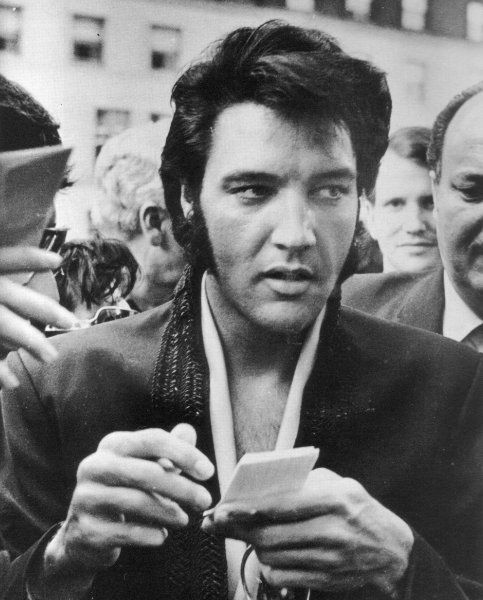
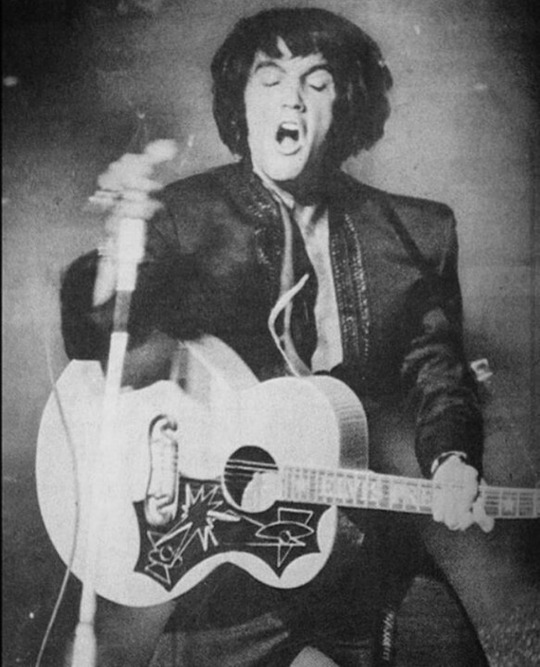
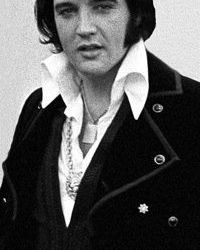
Did you notice that after Elvis retired his 1969 stage costumes, he took at least one of them and wore it as street wear? Did you know that this same suit is part of one of the most memorable moments of his life, not only as a musician and one of the most famous personalities in the United States entertainment business but also as an American citizen? Let's talk about how Elvis gave another use to the Black Cossack Top Two-piece suit (AKA Black Herringbone suit) after its debut in a Las Vegas venue in 1969.
NOTE FROM THE AUTHOR: This is a very interesting article I was baking and it took me a while to write. Possible misspellings and typos is a warning I should add in my work from now - and I'm sorry about that but English is not my first language so, I would appreciate if you point erros to me so I can correct them to improve the reading experience for other Elvis enthusiasts that may read it in the future. Anyway, my jaw dropped when I noticed this little fun fact on Elvis' wardrobe, so I had to share this with you. I fear this article is gonna sound a bit like a chronicle, but I hope you enjoy the reading. Hope to see you in the comments box, friends! Here we go.
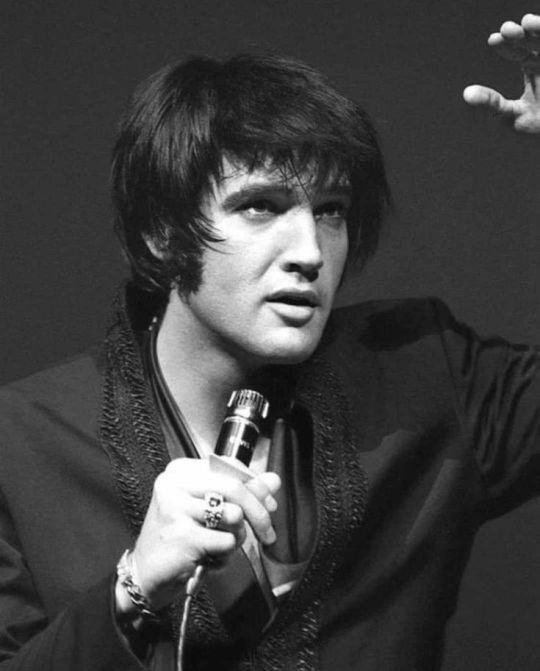
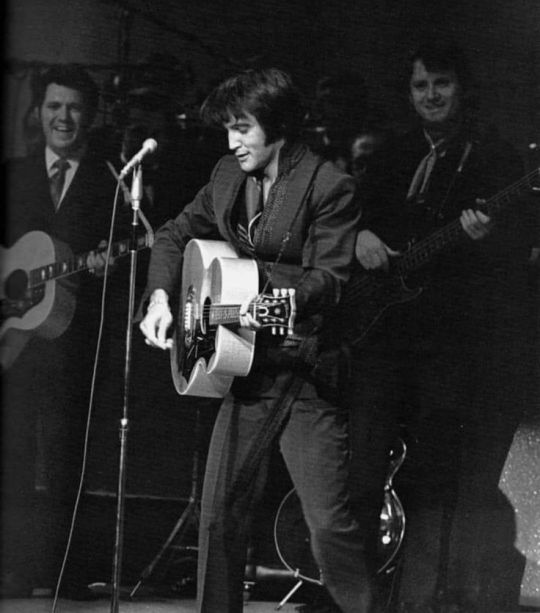
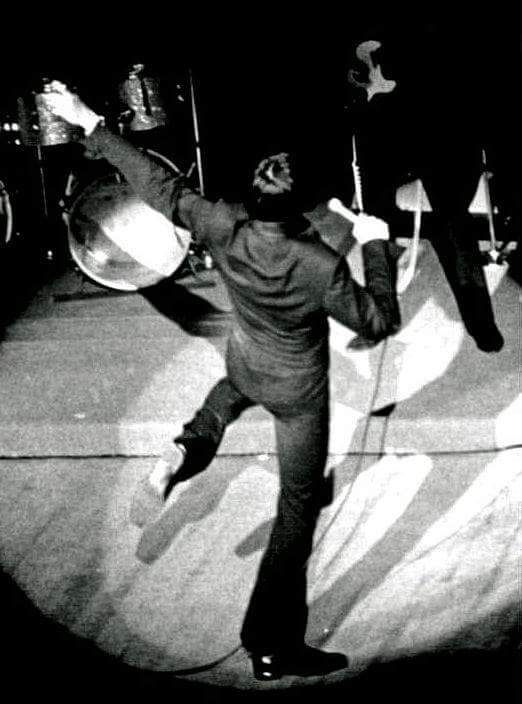
July 31, 1969. Elvis' opening night at the International Hotel in Las Vegas, Nevada.
That was a special night. The very first evening in eight years since Elvis Presley had last performed an actual live concert since the Pearl Harbor Memorial Charity Show on March 25, 1961 at the Bloch Arena in Honolulu, Hawaii. Quite the big deal, so let's talk a bit about the significance of those 1969 Elvis concerts before we get to the main topic because, I guarantee you, the things I'm gonna point next only add to the main topic of this article (although I might ramble a bit and it's gonna be boring for the Elvis lovers who already know the facts about this third 'comeback' moment along his career so... feel free to skip this first part if you'd like to).
That evening on July 31, 1969 marked a memorable moment, not only for the King himself and the audience eye-witnessing his opening concert in Las Vegas, but also for music critics, pop culture journalists and enthusiasts, the entertainment world as a whole - including Elvis' pairs, other artists both from the movies and the music industries, almost all of the A-list artists at the time were his friends - not to mention the thousands, millions of Elvis fans spread all over the globe, cheering for what would be received as a sign that, in a near future, they could have the pleasure to see the King in action again - or for the very first time for some younger fans he conquered after the NBC's '68 Comeback Special TV show the year before.
The NBC-TV Christmas special "Singer Presents... Elvis", aired on December 3rd 1968, worked perfectly as a tool to rekindle the flame of passion in old times admirers of the King of Rock and Roll, as well as it served as a glorious introduction of Elvis as a serious musician to new audiences composed then by teens and young adults - who were only babies and children when Elvis was already causing hysteria wherever he went in the 50s. Some sections of that TV show, although including live audiences present as they were filmed, can't be taken as his official comeback to live performances. There were lots of intermissions involved in the process of taping the live concerts segments for that TV special, as you can expect from any film production. Pauses to camera, sound, make up and outfit adjustments resulted in many different takes in their way to achieve the "sit-down" and "stand-up" concerts short cuts that were used in the final product of that unforgettable moment in Elvis' legacy better known as the "'68 Comeback Special" TV show. The breaks during the taping of that NBC music production did not give the audience present, or Elvis, for that matter, the same exciting energy a real live concert could provide, not to mention that the audiences attending the NBC studios in Burbank, CA, on June 1968 for the tapping of the live concerts segments of that Christmas special were very reduced - composed mainly by fan club members, as well as a few members of the press and some of Elvis' own relatives and friends. The majority of his fans, who watched in awe to his initial late 60s live performances through TV screens, were still waiting to see him again in action with their own eyes. The expectation was high, very high. Expectations and anxiety hitting the roof, everyone waiting to find out if that Tupelo boy still had it, if he was still the King of Rock and Roll or the title no longer was worth him and he had left the insane commotion he used to produce in people back in the 50s. The music industry and its audiences in late 60s were exceptionally different from the ones Elvis was used to entertain in person in the 50s and early 60s, which means that in 1968 he had a small taste of what they were like during the '68 Special production time but the control over the audience's reaction, the need to keep things good for what those tapes would look like on television, didn't give Elvis the real notion of the actual 60s audience and what captivated them then. In 1969 he didn't know what to expect from a live audience anymore. Entertainers learn the do's or don'ts of the business while they're working in real time - no pauses, no space to make mistakes. Besides, succeeding in one single TV-show is one thing, but going back on the road for real was a much bigger challenge, specially when you know Elvis was booked to perform at the same stage for an entire month, 30 days in a row. He was older then, the times were different... Critics were expecting him to fail even in the 50s, betting he would be a passing fancy. In 1969 some people still didn't have the faith he could last much longer in the business and keep being as adored as he had before, so the question hanging in the air among all distinct age range music fans then was: "There is still place for Elvis Presley in the 60s youth music? Isn't he too old to be playing 'Rock and Roll' now?" Everybody's eyes were on Elvis onstage in 1969 or the news reports telling how successful his comeback live shows were.
Interesting to note how 1969 was an exciting year for Elvis. He was moved by challenges. He had to prove his worth so many times over the years, and 1969 was another one of those arduous periods in his career where he had people to prove wrong. As we know, he did it. He proved that the years confined in Hollywood sets for the most part of that decade had not caused a slight damage to his awe-inspiring talent as a live performer. Onstage Elvis was visibly excited, jovial, good-humored and bluntly sexy as probably never seen before at all - which was denoted by a bunch of double-entendres X-rated jokes he seemed interestingly comfortable in sharing with the audiences in Vegas now, something he wouldn't dare to in the 50s when he debuted in the Sin City for the two-weeks engagement season at the New-Frontier Hotel in April-May 1956, when he was only a 21 year-old young man, still a bit insecure and taken as an easy target by the square 50s society. As for his looks in 1969, it was amazing how his sex appeal notably increased onstage, but that was known since the TV special. Elvis was always that handsome man but in a time where aging was much more than nowadays taken as "the end" for artists, a family man and father as Elvis was (maybe too much for what a Rock and Roll star represented), 34 year-old Elvis was on his prime in 1969. By all accounts, Elvis looked superhuman both in talent and image.
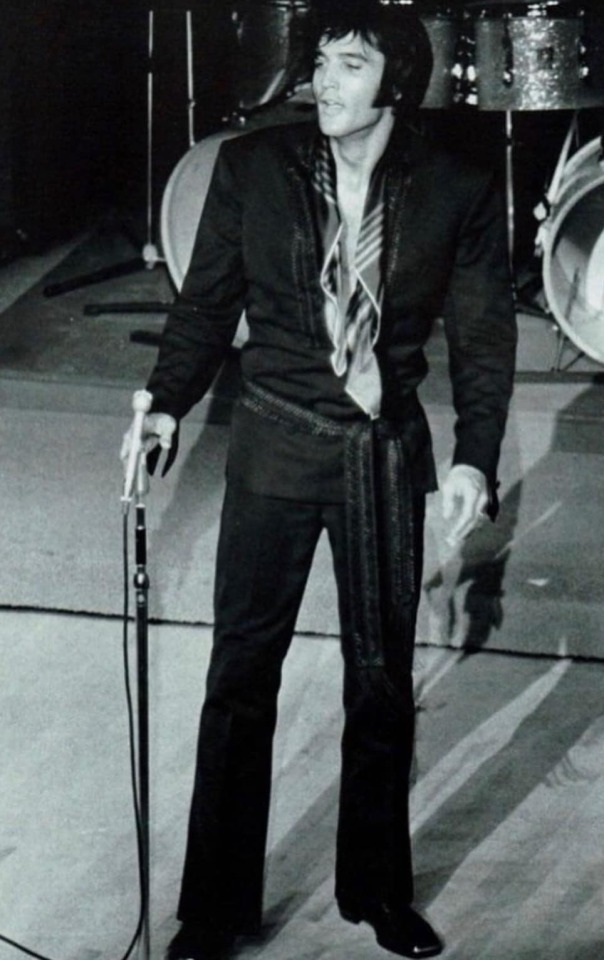
Now we get to the goodies.
For his comeback, Elvis' tall and trim figure was enhanced by solid-color tight-fitting suits. They weren't yet the phenomenal handmade embroidered/bejeweled jumpsuits that would add another layer to the amazement of watching Elvis' live concerts in a year and a half ahead on the road but still... they impressed the audience. The solid-color matching top and bottom pieces with their designs inspired by karate uniforms, delivered modest elegance. Solid colors, long lines, barely noticeable embroilment. Perhaps we could look at those 1969 two-piece suits as part of the cleanest version in Elvis' fashion style onstage... even the 50s suits were flashier than those late 60s ones.
The first stage costume to debut in that new era of the King's career, on that July 31st 1969 evening, was the Black Cossack Top Two-piece suit (AKA Black Herringbone suit). As accessories, a black karate-style belt that also featuring the herringbone pattern, with long fringes on both ends. A silk black scarf with blue and white stripes, completed the look in a moment of his life where all the jewels and shine that would mark his mature caricature as the most famous musician in the 20th century were yet to come. Some fans prefer the 1969/1970 nonchalant elegance from his stage-wear.
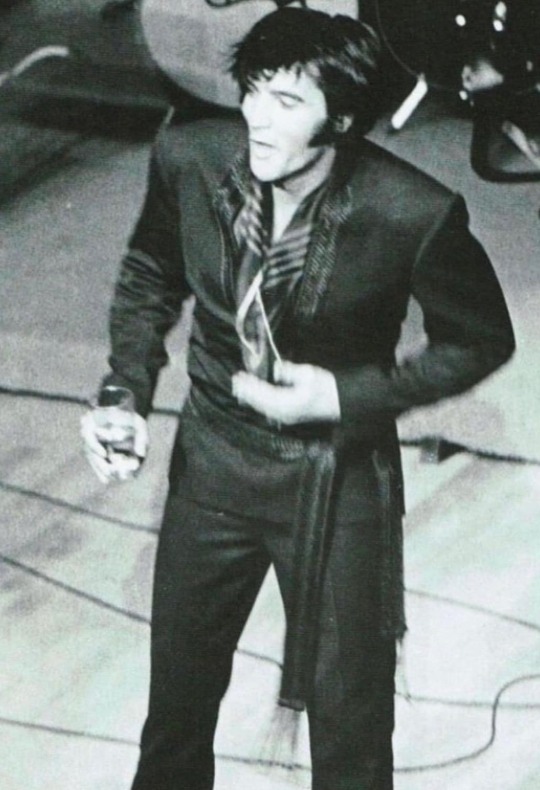
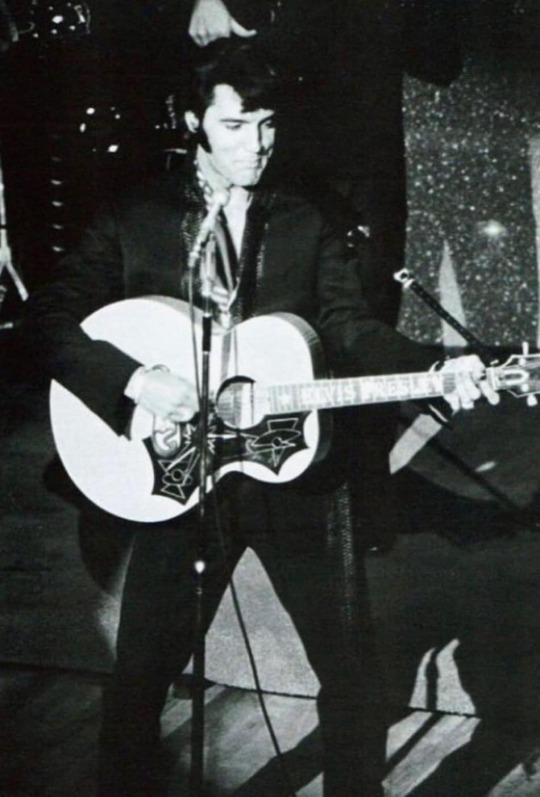
Elvis retired the Herringbone suit from the concerts sometime in 1970 when his stage costumes wardrobe had been already almost entirely reformulated for the following performances. After the Las Vegas opening engagement in August-September 1969, Elvis would be back onstage only the next year for another Las Vegas season at the International Hotel in January-February 1970. From the previous season, apparently the only suit still put to use was the White Cossack Top Two-piece (That's not an official information. Given the lack of documentation in pictures - unfortunately a constant among the many concerts held in Las Vegas - it's possible the Black Cossack suits - yes, there were two of them! - could have been worn again at least for the first engagement season in Vegas in 1970. However, no more than that). Quickly Elvis' modest stage-wear would be replaced by more eye-catching detailed suits that were, from then on, mainly in white, as the Broquade ones and the ones we know too well from his August-September 1970 engagement season at the International Hotel, as the Fringe suit, the Concho suit and the Red Ladder, all featured in Elvis' first documentary film "Elvis: That's The Way It Is".
Elvis was always looking for ways of how to improve his performances and make his shows better. The reason why Elvis' white suits collection in 1970 surpassed that of dark suits one, almost certainly, is because Elvis and his crew figured the dark-colored fabrics weren't as helpful as the light-colored ones on letting people spot him with ease if they were watching him from a certain distance to the stage. That was something he learned from being back on the road. Different from the Las Vegas venues with its limited space showrooms, the arenas where Elvis performed around the US were much more spacious, allowing over 10000 fans to attend his concerts, a considerable larger number than the mere 2200 people the International Hotel allowed in seats.
🏆 Talking about attendance, that 1969 opening season at the International Hotel granted Elvis the famous Gold Attendance Belt, a belt he wore proudly on and off-stage for many years. The belt was an award, given to Elvis by the hotel's management in recognition for his record shattering attendance achievements: 57 SOLD-OUT CONCERTS... IN A ROW. That belt is also important in this article.
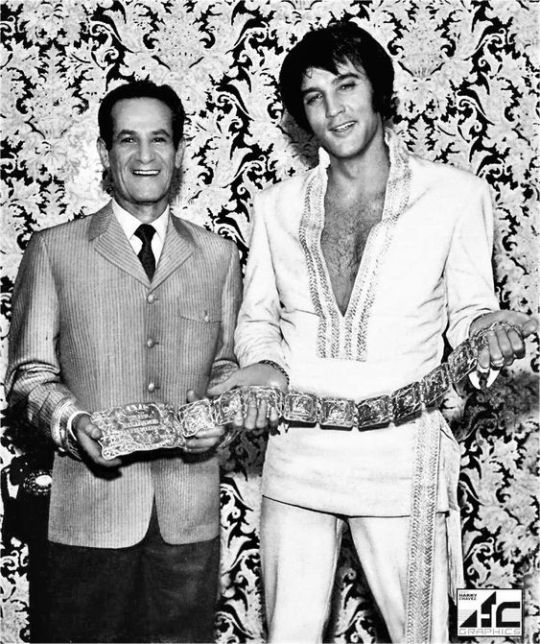
August 28, 1969: Elvis received a gold belt from Alex Shoofey immediately after his final show – the buckle reads 'World's Championship Attendance Record - International Hotel, Las Vegas, Nevada."
Alright, so, onstage from 1970 on, the King was more keen of light-color suits. Off- stage, however, the dark colored suits were still part of his fashion preferences - and he wouldn't change that. That's when the Black Cossack suit was put to good use again.
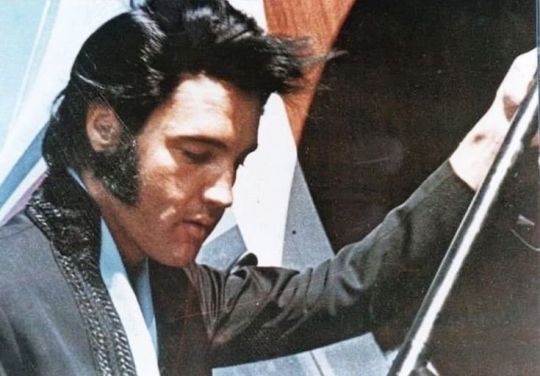
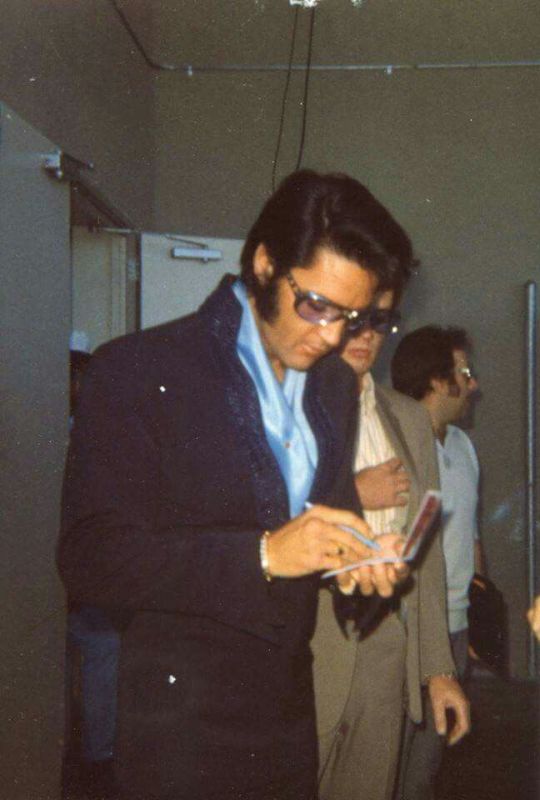
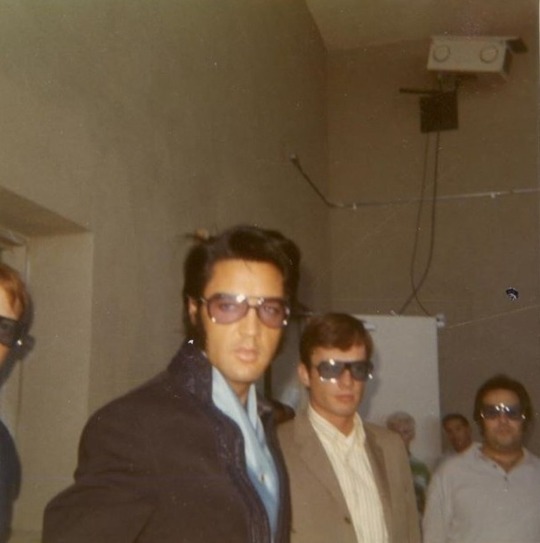
Phoenix, Arizona, on September 9, 1970.
In the moment the pictures (1-3 above and 1 below) were taken, Elvis had just finished another engagement season at the International Hotel in Las Vegas (Season 3, the one from which the footage featured in "Elvis That's The Way It Is" were captured. That season ran from August 10th to September 8th 1970), and then he was about to embark on his first road tour since returning to live performances.
The first concert out of Vegas venues (not including the Houston Astrodome, Texas, concerts in February-March 1970 in the account because they were a distinct deal), was on September 9th 1970, held at the Veteran Memorial Coliseum in Phoenix, AZ (8:30 pm). For that concert Elvis wore the Fringe suit onstage. By then, the Black Cossack suits were no longer an option for live concerts, but they were not abandoned by the King, as mentioned.
Now comes the most interesting part.
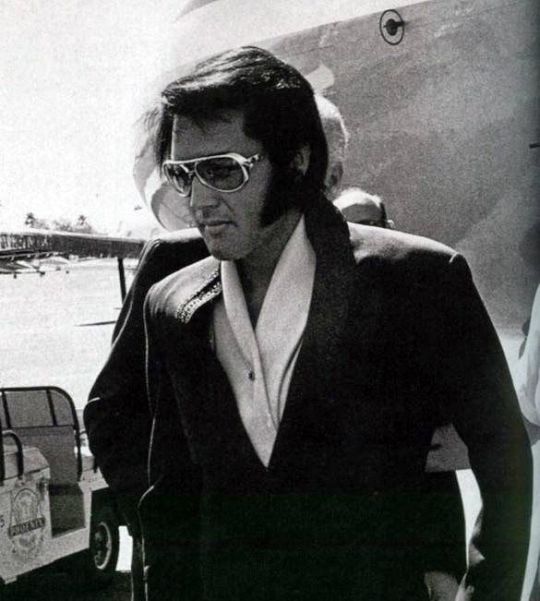
In 1970, Elvis Presley added those black suits from his official "comeback" shows to his personal wardrobe. There's a few observations I'd like to make about that. From that choice we can get how serious Elvis took his artist status. According to close friends, EP liked to dress up even when he was at home, simply because when people looked at him, they were expecting to see "Elvis Presley, the King"... therefore, he didn't want to disappoint them by dressing poorly. Elvis was so careful with his image that even his smiles were calculated to cause a certain reaction on people. The other day I heard Priscilla, his ex-wife, answering questions from fans on her Instagram page. She was asked "Why you don't smile much in pictures?" Her answer was something like: "Probably because of something that Elvis said. He used to say not smiling would give you a sexier look in pictures." Anyway, The King would always dress to the nines, rather he was going to make music in recording studios, present himself to work in film sets in Hollywood, perform live, vacation in Hawaii or simply trying to unwind taking a well deserved "resting" time home in Memphis. That's fair game if you remember how Elvis often visited with the fans whenever he saw them. Regardless of the pauses between tours when he could take it easy and just relax, Elvis appreciated his fans' efforts in spending hours hanging outside his places, recording studios and so on. He knew and valued how they were sincere in their love, standing for hours under sun or rain in the open, hoping to catch a glimpse of him just casually walking, horseback riding or playing with his friends and family inside his properties grounds. It was not like he could escape candid photographers anyway so, at least he wanted to be portrayed in all his glory. Elvis was always the King, on and off stage, practically 24/7 - whenever he was awake. The boy from Tupelo turned into a indistinguishable public persona. Anybody could recognize him from miles away, specially in the 70s with his elegant wardrobe choices. Wearing the same suits he wore onstage, the same suits that were displayed in magazines and news attesting his imperious comeback in 1969, helped quite a bit in that matter, if you think about it. That makes the choice to bring some of the dark retired stage costumes into his daily life even more interesting. Now, the next pictures in which Elvis is seeing wearing the Herringbone suit off-stage, are quite fun. To think they are the most required pictures of Elvis Presley among the endless photographs taken of him from the 50s until the end of his lifetime! And, the whole point of this article is here. YES: the same suit debuting with Elvis onstage for his comeback season to live performances in 1969 was also with him inside the White House.
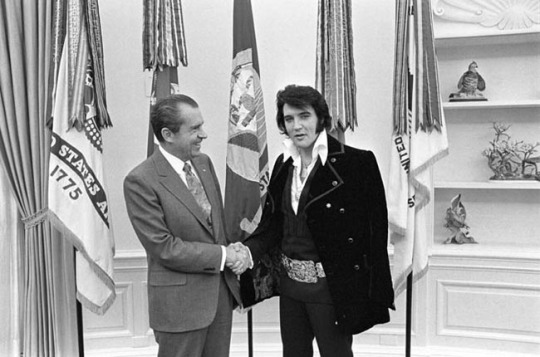
On December 21st 1970, Elvis Presley visited the President Nixon at the White House in Washington, D.C. This is one of the most famous stories involving famous characters in the U.S. History. Take a closer look at the pictures and you'll see that the second layer of clothes on Elvis' upper body is precisely the top of one of the Black Cossack suits. Can you see the herringbone pattern there?

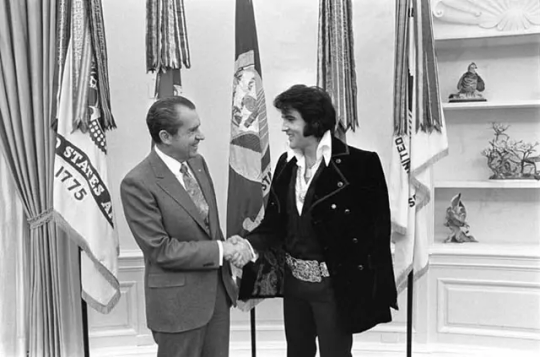

SECRET REASONS FOR THE OUTFIT CHOICE?
AUTHORS NOTE [2]: I'm gonna ramble on the possible reasons for Elvis' attire choice that day in December 1970. None of this is factual, just a fan's speculation. I'm purely reading between lines here but I wanted to share my thought with you.
There are only two possibilities, friends: RANDOM OR CONCIOUS DECISION.
1° scenario: As we know, that wasn't a visit planned in advance. Elvis suddenly decided he wanted a Narcotics Agent badge so bad he would fly to Washington to try to get one. His personal life was a mess, his marriage was at the verge of ending and his father was all over him about what he considered a poor use of his fortunes, the way Elvis was spending his money at that time with lavish gifts to friends and random strangers sometimes too. He needed a win - and there he was on his way to Washington to get it. It's more reasonable to think there wasn't really a deep thinking on which outfit he would wear that day but, if that is the fact, we still have to think Elvis did think at least a bit of planing his outfit for the occasion. Remember how every account points to Elvis being extremely careful with his looks? Imagine Elvis picking his outfit that day. The most casual thought I can imagine him having is: "If the outfit is good enough for my comeback in Vegas, it is good enough for the White House." Period. He focused more on his speech to the President of United States than on his wardrobe choice and put his Nation's biggest authority in more or less the same level of importance of his own fans, which is cute - for us. Why would he dress better for the President than he dressed for his fans, right? They were everything to him and more, by all accounts. But there's the 2° possibility: The Black Two-Piece Herringbone suit combined with the Gold Attendance Belt actually meant something special to Elvis, as a kind of good luck charm, per say. Those pieces were not as any just another outfits in his wardrobe. They were involved in one of the most glorious moments of the then most recent part of his career. Perhaps they brought him some kind of energy, serving him as a confidence boost or something.
I think Elvis didn't do things by chance. He planned his moves. His outfit choices were not just a matter of being seen but, primarily, a matter of feeling confident in his own skin. Elvis used fashion purposefully... for instance, hiding his neck out of a personal insecurity with his body from his childhood years (which unintentionally created a fad with the high collars). Thus, it's reasonable to imagine that the outfit Elvis wore on December 21, 1970 combined with that special accessory was a conscious choice. The Gold Attendance Belt was an achievement award Elvis took pride from and were often after being seen with, and the Black Herringbone suit, practically identical to the one he opened the season at the International Hotel the year before, from which that special golden belt award would come resulting for his hard work and dedication to entertaining audiences, certainly marked a special day for him. Isolated as part of other outfit combinations those pieces don't look like hiding their intentions, but when put together maybe they brought Elvis a special energy that served as a mental reminder of who he was in a moment where self-confidence was extremely necessary to increase his persuasion tactics. I mean... Elvis had too many clothes, why wearing the Black Herringbone suit that day? By chance? Maybe he wore the exact suit to help him in that challenge ahead, like an armor serves a knight... sort of. A tool. I guess nobody would think it would be easy to convince the President of the United States that Elvis Presley was a law agent material other than just a remarkable musician, much less himself. I guess even the King needed something to make him believe in himself sometimes.
Again, just speculation. As far as we all know, the Black Herringbone suit was a random choice Elvis made on the day he met President Richard Nixon. The whole point of the article is pointing out he was wearing the suit there as he was on his comeback live performance in 1969.

There. Another layer of fun was added to that remarkable moment in the America History.
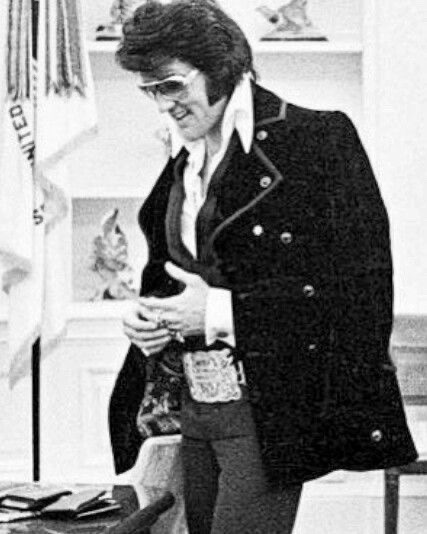
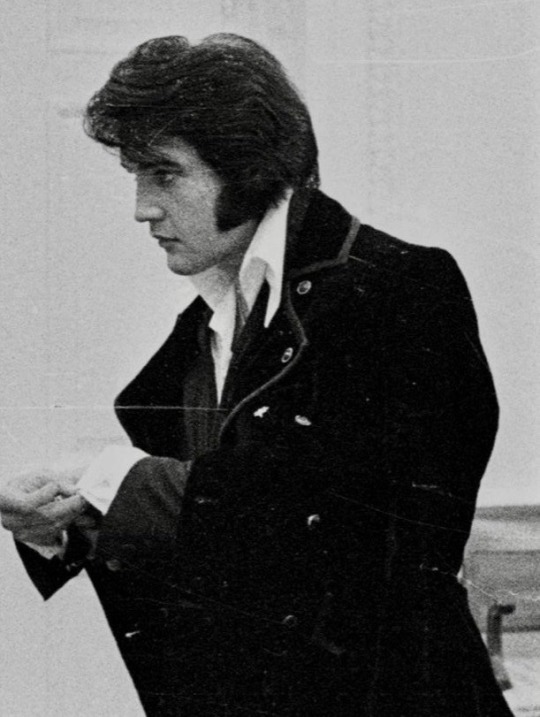
Just to explain better, in the pictures above Elvis is wearing the top of the second version of the Black Cossack suit. There is a difference between the two costumes, almost imperceptible at first glance. The second version of the costume had a small improvement in the stitching of the herringbone pattern on the chest area.
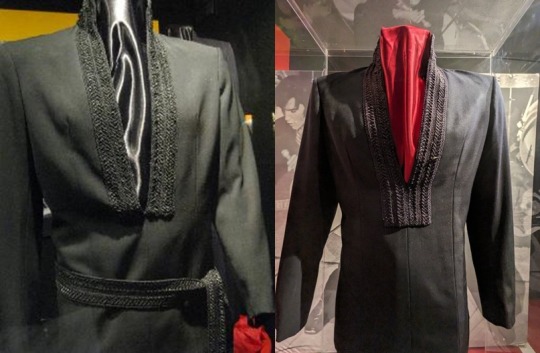
"The Black Cossack Top Two-Piece (2) is a black two-piece suit that initially appeared identical to the Black Cossack Top Two-Piece (1). However, upon closer inspection, notable difference becomes evident. The Herrinbone design in the chest for the second suit actually is stitched at the end of the chest to keep the garment from opening."
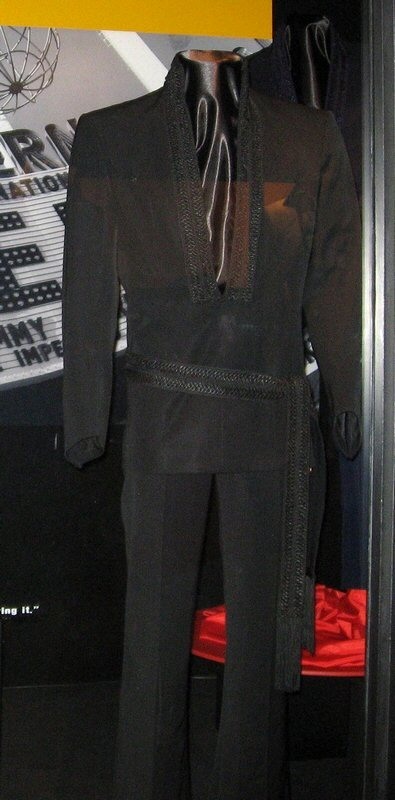
To end this article with another fun fact on Elvis' stage costumes, I could trace a parallel between the Herringbone suit with the time when Elvis did the opposite move with another of his outfits. Instead of bringing an outfit from the concerts into his street wear wardrobe, he took a casual outfit and brought it onstage with him. On August 19, 1975 in Las Vegas, the Two-Toned Street suit (AKA Penguin suit) made his debut and retirement from the stage lights at once. Rumors are Elvis was late for the concert and just walked into the stage with the suit he had on at the time. He had several different two-tones suits. The second picture below shows EP wearing that suit in a casual setting.
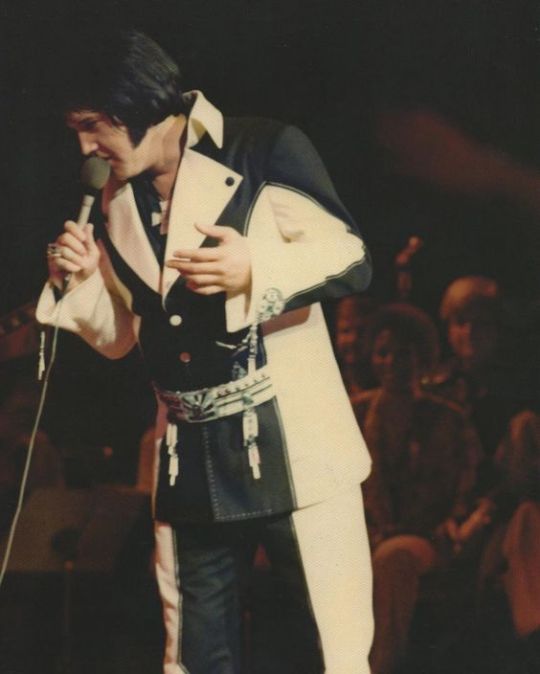
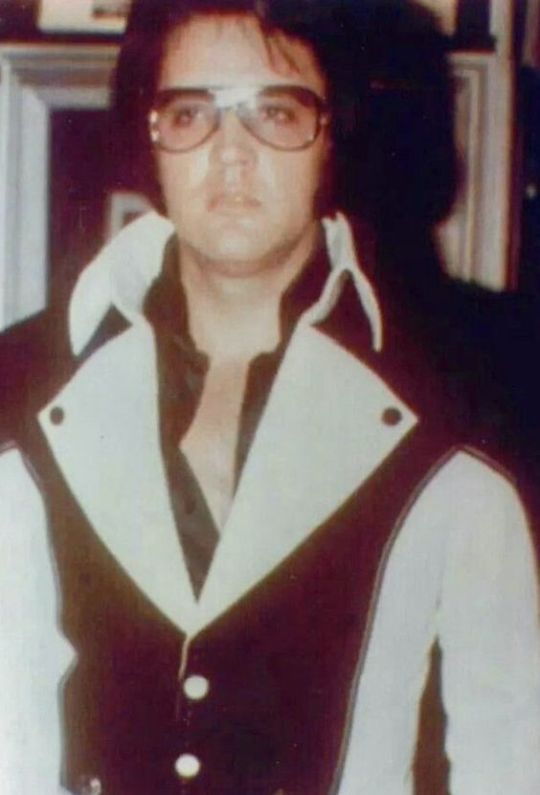


#elvis presley#elvis history#elvis fashion#elvis jumpsuits#black cossack two-piece suit#black herringbone suit#1969#1970#president richard nixon#elvis#70s elvis#elvis the king
55 notes
·
View notes
Text
Astarion's ascension is extremely popular, despite it clearly being the designed bad ending for him.
So many fans of this version want to argue that it's a "valid" path to choose if you enjoy his character, or that it's equally good as his Spawn ending. The "it's what he wants" argument is the hegemonic justification in question.
But is wanting something better than needing another thing? Yes, he talks about ascension ever since he finds out about the ritual.
Yes, when push comes to shove he's still committed to ascend. But is this enough? Should we support his choice, even when everything but his words tell us not to? Should we trust the judgment of a deeply traumatized man about the best way for him to feel better?
This may sound harsh, but the answer is no.
Because in many circumstances, we see Astarion behaving unhealthily as a result of his trauma: he's hypersexual at the beginning of the game, using sex as a survival mechanism. He's yet to learn what his boundaries should be, what it means not to be an object, to see himself as a person that deserves respect and has so much more to offer than just his body. His trauma is still fresh. And he's so scared of losing his freedom, being trapped under slavery again.
We can't blame him being so desperate to feel safe that he will trade everything he is for it.
Because that's what the ritual means, Cazador says so himself: despite gaining the ritual's power, Astarion is still part of the bargain for said power. He still loses his soul in the process, and that is clear once we see how he acts post-ascension.
Of course, someone that is still suffering from the consequences of 200 years of abuse wouldn't care if he became less of himself, in the process of becoming untouchable ever again. Astarion's behaviour towards himself highlights that he doesn't care for the person he is because that person is, sadly, the product of those centuries of abuse.
He doesn't want to be that person anymore: even better, he doesn't want to be a person anymore: people suffer, people get taken advantage of, people are submitted by more powerful beings. He is willing to give this up not despite losing everything he is, but because of it. And that's what happens after his ascension: he retains his body, which becomes an empty shell of who he once was, with someone else inside of it to fill the void left by his soul.
This situation is a perfect, brutal metaphor of an abused person that later in life becomes the abuser himself, a thing that often happens to male victims of SA.
This is what is fundamentally wrong with Astarion's ascension: he's choosing power, his abuser's tool, over healing. Instead of learning to feel like a person again, to deal with his trauma to life after having endured it, he chooses to not feel anymore, while letting thousands of spawns (like he was) be consumed to get what he wants.
This terribly selfish act is the first instance of Astarion behaving like Cazador, considering the spawns as lesser beings, as nothing but his tools, like all vampire lords do. In this process he also sees himself, the person he gives up being, as a tool. He isn't healing. He's losing all of himself entirely.
Why would someone see this sacrifice as not only necessary to leave his trauma behind, but also preferable to healing from it?
The fan-favourite characteristic of Ascended Astarion is his behaviour towards Tav: in this version of "himself", he clearly is even more sexual than he was in his first days with the tadpole. And this expression of his sexuality is drastically different from the one we got to know prior to this point.
He is dominant, prevaricating, demanding in his avances: he enjoys being in a position of power even in his relationship.
This isn't the Astarion that slowly learns to trust his partner, to build a real loving relationship with someone who sees him as equal and truly cares for him.
Everything that he learns during his romance and his plot gets nullified by his ascension; and yet, this gets overlooked in favour of this more sexually appealing version of him. For people that claim to love his character because of his complexity, Ascended Astarion fans seem to only truly love him when he's less of himself than ever.
When all that's left of him is his body, and he behaves more like the toxic love interest from a young adult romance book, a great number of his fans get wild. Is this all that they want from him? The husk of the funny, sarcastic, dramatic and complex character, filled with this more traditionally masculine attitude, replacing what he used to be? An Astarion that never heals from his trauma, choosing to leave behind everything he was instead? Who resembles his abuser more than ever?
Do his fans who like his ascended version so much to genuinely think this is the best outcome for him, or do they just enjoy being able to project this "macho" fantasy on a physically attractive male character, that otherwise isn't anything like this prototype of man?
We can't help but think that appreciating Ascended Astarion is the same as believing in, if not loving, his hypersexual facade: it's overlooking his humanity in favour of sexualising him.
Which is the biggest disservice one could ever do to his character.
#bg3 astarion#bg3#bg3 tav#bg3 companions#baldur’s gate 3#baldurs gate tav#baldur's gate iii#baldur's gate 3#baldurs gate astarion#discourse#ascended astarion#spawn astarion#tw: sa#cazador szarr#astarion ancunin#astarion ancunín#astarion x tav#astarion romance#bg3 ending#tav oc#anti ascended astarion
204 notes
·
View notes
Text
she visualized—and then she shifted *ੈ✩‧˚
this post is about how visualization is scientifically proven to be an effective method of manifestation
i've always been a big fan of visualizing–whether it's for shifting or just daydreaming before bed. recently, i've been coming across lots of videos mentioning how visualization can affect us vastly, both physically and mentally.
i did my research only to find out that this is completely fact-based.
the practice of visualization is an immensely powerful tool for the human mind. it engages brain regions that involve perception, attention and memory. it also has the ability to effectively reprogram our subconscious minds.
visualization activates the same neural circuits as actual experiences and has shown to improve performances, learning and well being. some big examples are: muhammad ali, oprah winfrey and arnold schwarzenegger - they've all recommended visualization as a tool for success.
a study has documented the positive effects of visualization and its correlation to better performance outcomes for athletes. this is because when we visualize ourselves doing something, our brains believes we've already done it, which helps build confidence that there is nothing to fear.
another study observed the effects of visualization practices on muscle power. the results showed that by simply thinking about training their muscles, participants successfully increased their muscle strength by 35% compared to those who didn't.
muhammad ali once stated: “if my mind can conceive it and my heart can believe it, then I can achieve it” this is literally backed by science.
scientists have looked into the validity and effectiveness of visualization techniques to see whether visualization actually helps improve well-being:
dr. tor wagner has stated "imagination is a neurological reality that can impact our brains and bodies in ways that matter for our well-being"
when we vividly use all five senses in visualizations, we're able to trick our minds into believing that we already have what we want. in other words: our brains can't tell the difference between imagination and reality. this is exactly why visualization is such a powerful tool when it comes to shifting.
whether you're trying to step into the best version of yourself in this reality or shift to another one, visualization empowers you w/ the confidence and clarity to align your thoughts w/ your desires.
⭒ okay but how can i effectively use visualization to shift?
it's important to note that visualization isn't wishful thinking. it's about embodying a new state of being. practicing it regularly can help rewire your mind and help you embody your DR self.
anyway, here are some tips!
-
daily routine:
-make visualization a routine. do it in the morning or before bed and try do practice it for at least 10 minutes a day to establish a consistent habit
senses:
-use all your five senses while visualizing to have the most psychological impact. focus on what you can see, hear, taste, smell and feel in each moment. subliminals or guided shifting meditations can also be helpful here (alunir!!)
also, during this part: let the scenario flow naturally. don’t force anything even if you can’t "smell" the coffee or "taste" it. it’s fine, dw. forcing the scenario can be very draining, speaking from experience—especially during the day.
writing:
-make a script of how the scenarios in your DR will play out, scene by scene. the more details, the better. also, focus on how you're feeling at each point in the scenario—you're not just imagining it, you're experiencing it.
vision board:
-make a vision board. add a collection of photos, quotes and images that reflect you DR. keep this vision board somewhere you spend a lot of time. it’s basically just a physical pinterest collection. keeping it in your line of sight can reinforce the power of your vivid visualizations
-
the more real it feels to your mind, the closer it becomes to being your reality.
shifting isn't just a possibility, it's natural when your mind actually believes that you're already there :)
#visualization#visualizing#law of assumption#reality shifting#loassumption#shiftblr#neville goddard#shifting realities#shifting tips#shifting motivation#shifting#shiftingrealities#shifting community#loassblog#loassblr#loa tips#shifter
43 notes
·
View notes